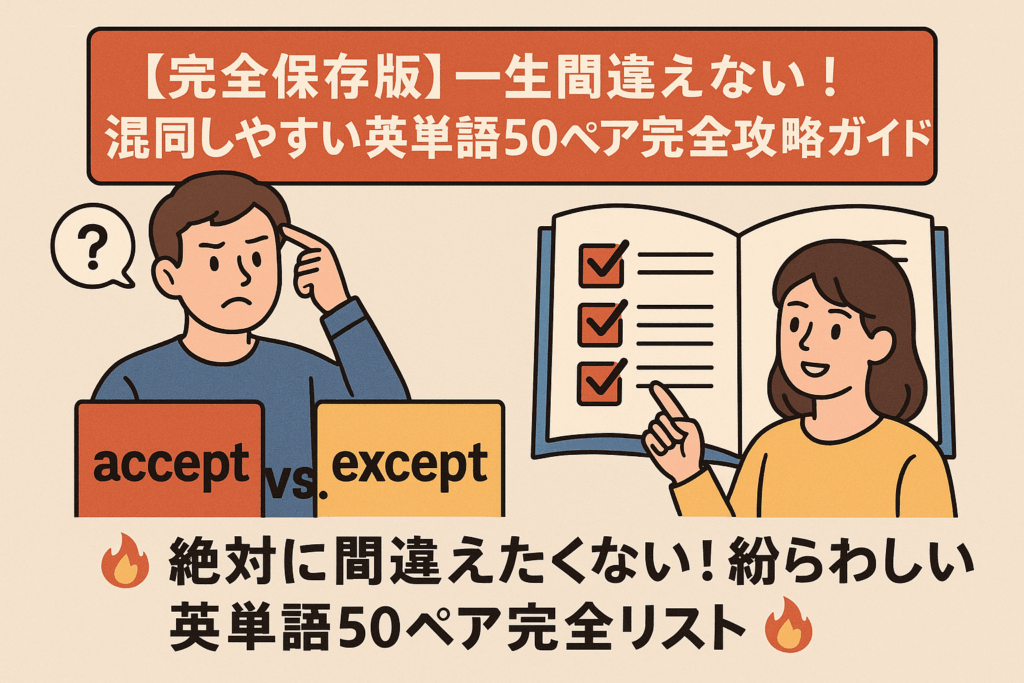
「accept」と「except」の違い、即答できますか?ネイティブでも間違える紛らわしい英単語ペアを完全マスター!TOEICや英検で必ず出題される頻出単語ばかり。この50ペアを覚えれば、もう恥ずかしい間違いとは永遠にサヨナラできます。スペルが似ているだけに、一度間違えると信頼性が一気に下がる危険な単語たち。今すぐチェックして、あなたの英語力を劇的にレベルアップさせましょう!
🔥絶対に間違えたくない!紛らわしい英単語50ペア完全リスト🔥
| No. | 単語ペア | 単語1の意味 | 単語2の意味 |
|---|---|---|---|
| 1 | accept vs. except | accept = receive(受け入れる) | except = exclude(除外する) |
| 2 | adopt vs. adapt | adopt = take up/use(採用する) | adapt = adjust(適応する) |
| 3 | adverse vs. averse | adverse = harmful(有害な) | averse = opposed(反対している) |
| 4 | affect vs. effect | affect = to influence(影響を与える)※動詞 | effect = result(結果)※名詞 |
| 5 | allude vs. elude | allude = indirectly refer(間接的に言及する) | elude = escape(逃れる) |
| 6 | altogether vs. all together | altogether = entirely(完全に) | all together = everyone in a group(みんな一緒に) |
| 7 | amicable vs. amiable | amicable = friendly (person)(友好的な※人) | amiable = friendly (relationship)(友好的な※関係) |
| 8 | assure vs. ensure vs. insure | assure = to promise(約束する) ensure = to guarantee(保証する) |
insure = protect financially(金銭的に保護する) |
| 9 | beside vs. besides | beside = next to(~の隣に) | besides = in addition to(~に加えて) |
| 10 | breath vs. breathe | breath = noun (air taken in)(息※名詞) | breathe = verb (to inhale/exhale)(呼吸する※動詞) |
| 11 | capital vs. capitol | capital = city or wealth(首都または資本) | capitol = government building(議事堂) |
| 12 | cite vs. site vs. sight | cite = quote(引用する) site = location(場所) |
sight = vision(視覚) |
| 13 | complement vs. compliment | complement = completes(補完する) | compliment = praise(褒める) |
| 14 | conscience vs. conscious | conscience = moral sense(良心) | conscious = aware/awake(意識がある) |
| 15 | council vs. counsel | council = group/assembly(議会) | counsel = advice or lawyer(助言または弁護士) |
| 16 | desert vs. dessert | desert = dry land/abandon(砂漠/見捨てる) | dessert = sweet dish(デザート) |
| 17 | discreet vs. discrete | discreet = careful, tactful(慎重な) | discrete = separate, distinct(別々の) |
| 18 | disinterested vs. uninterested | disinterested = impartial(公平な) | uninterested = not interested(興味がない) |
| 19 | e.g. vs. i.e. | e.g. = for example(例えば) | i.e. = that is / in other words(つまり) |
| 20 | elicit vs. illicit | elicit = draw out(引き出す) | illicit = illegal(違法な) |
| 21 | emigrate vs. immigrate | emigrate = leave one’s country(国を出る) | immigrate = enter another country(国に入る) |
| 22 | eminent vs. imminent | eminent = famous, respected(著名な) | imminent = about to happen(差し迫った) |
| 23 | explicit vs. implicit | explicit = stated clearly(明確な) | implicit = implied(暗黙の) |
| 24 | farther vs. further | farther = physical distance(物理的距離) | further = figurative/extent(比喩的/程度) |
| 25 | fewer vs. less | fewer = countable(数えられる) | less = uncountable(数えられない) |
| 26 | flammable vs. inflammable | flammable = easily set on fire(可燃性の) | inflammable = easily set on fire(可燃性の)※同じ意味! |
| 27 | historic vs. historical | historic = significant(歴史的に重要な) | historical = relating to history(歴史に関する) |
| 28 | hoard vs. horde | hoard = stockpile(蓄える) | horde = large crowd(大群) |
| 29 | ingenious vs. ingenuous | ingenious = clever(巧妙な) | ingenuous = innocent, naïve(純真な) |
| 30 | imply vs. infer | imply = suggest(暗示する) | infer = conclude(推論する) |
| 31 | its vs. it’s | its = possessive(それの) | it’s = it is / it has(それは) |
| 32 | lay vs. lie | lay = put down (needs object)(置く※目的語必要) | lie = recline (no object)(横になる※目的語不要) |
| 33 | lightning vs. lightening | lightning = electrical flash(稲妻) | lightening = making lighter(明るくすること) |
| 34 | lose vs. loose | lose = misplace(失う) | loose = not tight(ゆるい) |
| 35 | moral vs. morale | moral = ethics(道徳) | morale = spirit/confidence(士気) |
| 36 | of vs. off | of = belonging to(~の) | off = away from(離れて) |
| 37 | persecute vs. prosecute | persecute = oppress(迫害する) | prosecute = take legal action(起訴する) |
| 38 | pour vs. pore | pour = flow liquid(注ぐ) | pore = tiny opening / study closely(毛穴/熟読する) |
| 39 | prescribe vs. proscribe | prescribe = recommend/authorize(処方する) | proscribe = forbid(禁止する) |
| 40 | principal vs. principle | principal = head or main(校長/主要な) | principle = rule/standard(原則) |
| 41 | raise vs. raze | raise = lift up(上げる) | raze = demolish(破壊する) |
| 42 | respectfully vs. respectively | respectfully = with respect(敬意を持って) | respectively = in order given(それぞれ) |
| 43 | stationary vs. stationery | stationary = not moving(静止した) | stationery = writing supplies(文房具) |
| 44 | than vs. then | than = comparison(~より) | then = sequence in time(その時) |
| 45 | there vs. their vs. they’re | there = place(そこ) their = possessive(彼らの) |
they’re = they are(彼らは) |
| 46 | to vs. too vs. two | to = preposition(~へ) too = also/excessively(~も/過度に) |
two = number(2) |
| 47 | who vs. whom | who = subject(主語) | whom = object(目的語) |
| 48 | whose vs. who’s | whose = possessive(誰の) | who’s = who is / who has(誰が) |
| 49 | your vs. you’re | your = possessive(あなたの) | you’re = you are(あなたは) |
| 50 | waver vs. waiver | waver = to be uncertain(揺れる) | waiver = a written relinquishment of a right(権利放棄書) |
なぜこの50ペアが英語学習の最重要ポイントなのか
これらの単語ペアは、ネイティブスピーカーでさえ間違えることがあるほど紛らわしいものばかりです。しかし、だからこそ正確に使い分けができれば、あなたの英語力は確実に「上級者」として認識されます。特にビジネスメールや論文、プレゼンテーションでこれらの単語を間違えると、内容がどんなに素晴らしくても信頼性が大きく損なわれてしまいます。
効果的な覚え方:5つの最強テクニック
1. ビジュアル記憶法
「desert(砂漠)」は「s」が1つで乾燥している、「dessert(デザート)」は「s」が2つで「Sweet Stuff」と覚えます。「principal(校長)」の最後は「pal(友達)」、校長は生徒の友達になるべき、という具合に視覚的なイメージと結びつけて記憶します。
2. 文脈セット記憶法
必ず例文とセットで覚えることが重要です。「I need to accept all applications except the late ones.(遅れたもの以外のすべての申請を受け入れる必要がある)」のように、混同しやすい単語を1つの文に入れて対比させながら覚えます。
3. 品詞識別法
「affect」は動詞(Action)、「effect」は名詞(Noun)と覚えます。「breath」は名詞で「th」で終わる、「breathe」は動詞で「e」で終わると、品詞と語尾を関連付けて記憶します。
4. 語源理解法
「emigrate」の「e」は「exit(出る)」、「immigrate」の「im」は「in(入る)」と語源から理解します。「persecute」の「secut」は「follow(追う)」、つまり追い詰めて迫害する、「prosecute」の「prosecut」は「pursue legally(法的に追求する)」と分解して覚えます。
5. 日常実践法
毎日のメールやSNS投稿で意識的にこれらの単語を使い分ける練習をします。特に「its/it’s」「your/you’re」「there/their/they’re」は日常的に使用頻度が高いため、正しく使えるようになると英語力の向上を実感できます。
TOEIC・英検・ビジネス英語での頻出度と重要性
TOEIC頻出トップ10
1. affect/effect(Part5の定番)
2. fewer/less(Part6での語彙問題)
3. complement/compliment(リーディングセクション)
4. principal/principle(ビジネス文書)
5. ensure/insure/assure(契約書関連)
6. cite/site/sight(レポート関連)
7. council/counsel(会議関連)
8. respectively/respectfully(フォーマル文書)
9. imply/infer(読解問題)
10. adopt/adapt(企業戦略関連)
これらの単語は、TOEICで年間平均3-5回は必ず出題されており、正答率が合否を分ける重要問題となっています。
実践トレーニング:1ヶ月完全マスタープログラム
第1週:基礎10ペア集中
まず使用頻度の高い「accept/except」「affect/effect」「its/it’s」「your/you’re」「there/their/they’re」など、日常的に遭遇する10ペアを完璧にします。毎日5つずつ例文を作成し、声に出して練習します。
第2週:ビジネス頻出15ペア
「ensure/insure/assure」「principal/principle」「council/counsel」など、ビジネスシーンで重要な15ペアを学習します。実際のビジネスメールのテンプレートを作成し、正しく使い分ける練習をします。
第3週:アカデミック15ペア
「cite/site/sight」「explicit/implicit」「imply/infer」など、論文やレポートで必要な15ペアを習得します。学術論文から実例を探し、使用文脈を理解します。
第4週:総復習と実践応用
50ペアすべてを使った英作文に挑戦します。1日1ペアずつSNSで例文を投稿し、実際に使うことで定着を図ります。オンライン英会話で意識的に使用し、ネイティブチェックを受けることも効果的です。
間違えやすいポイントと対策
特に日本人が間違えやすいのは、発音が似ている単語と日本語訳が同じになる単語です。例えば「flammable」と「inflammable」は両方とも「可燃性」という同じ意味ですが、多くの人が反対の意味だと勘違いします。また、「conscience(良心)」と「conscious(意識がある)」は、日本語の「意識」という言葉に引っ張られて混同しがちです。
これらの間違いを防ぐには、英英辞典を使って本来の意味を理解することが重要です。また、Google検索で「”accept” vs “except” examples」のように検索すると、ネイティブが作成した豊富な例文を見つけることができます。






